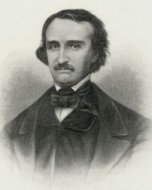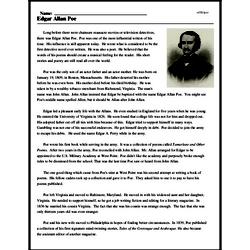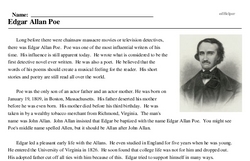Edgar Allan Poe
Edgar Allan Poe
Reading Comprehension for January 19
Long before there were chainsaw massacre movies or television detectives, there was Edgar Allan Poe. Poe was one of the most influential writers of his time. His influence is still apparent today. He wrote what is considered to be the first detective novel ever written. He was also a poet. He believed that the words of his poems should create a musical feeling for the reader. His short stories and poetry are still read all over the world.
Poe was the only son of an actor father and an actor mother. He was born on January 19, 1809, in Boston, Massachusetts. His father deserted his mother before he was even born. His mother died before his third birthday. He was taken in by a wealthy tobacco merchant from Richmond, Virginia. The man's name was John Allan. John Allan insisted that Edgar be baptized with the name Edgar Allan Poe. You might see Poe's middle name spelled Allen, but it should be Allan after John Allan.
Edgar led a pleasant early life with the Allans. He even studied in England for five years when he was young. He entered the University of Virginia in 1826. He soon found that college life was not for him and dropped out. His adopted father cut off all ties with him because of this. Edgar tried to support himself in many ways. Gambling was not one of his successful endeavors. He got himself deeply in debt. Poe decided to join the army to escape his debts. He used the name Edgar A. Perry while in the army.
Poe wrote his first book while serving in the army. It was a collection of poems called Tamarlane and Other Poems. After two years in the army, Poe reconciled with John Allan. Mr. Allan arranged for Edgar to be appointed to the U.S. Military Academy at West Point. Poe didn't like the academy and purposely broke enough rules to be dismissed from the school. That was the last time Poe saw or heard from John Allan.
The one good thing which came from Poe's stint at West Point was his second attempt at writing a book of poems. His fellow cadets took up a collection and gave it to Poe. They asked him to use it to pay to have his poems published.




